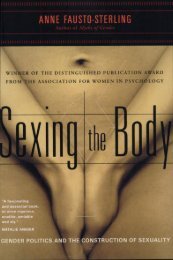C. Wiebes - Intelligence en de oorlog in Bosnië 1992-1995. De rol van de inlichtingen- en veiligheidsdiensten - Engels
C. Wiebes - Intelligence en de oorlog in Bosnië 1992-1995. De rol van de inlichtingen- en veiligheidsdiensten - Engels
C. Wiebes - Intelligence en de oorlog in Bosnië 1992-1995. De rol van de inlichtingen- en veiligheidsdiensten - Engels
- No tags were found...
You also want an ePaper? Increase the reach of your titles
YUMPU automatically turns print PDFs into web optimized ePapers that Google loves.
29<strong>in</strong> all, Van Kapp<strong>en</strong> found it a ‘shameful exhibition’. 101 A s<strong>en</strong>ior German <strong>in</strong>tellig<strong>en</strong>ce official confirmedthis <strong>de</strong>scription. A specific person was p<strong>in</strong>po<strong>in</strong>ted and this particular person was the only one toreceive <strong>in</strong>tellig<strong>en</strong>ce from the BND. The official also confirmed that files with national <strong>in</strong>tellig<strong>en</strong>ce were<strong>de</strong>signed <strong>in</strong> or<strong>de</strong>r to <strong>in</strong>flu<strong>en</strong>ce certa<strong>in</strong> UN officials. 102American <strong>in</strong>tellig<strong>en</strong>ce support to the UN was limited, partly because of the ‘varied’ compositionof this unit. The docum<strong>en</strong>ts that were han<strong>de</strong>d over were oft<strong>en</strong> unclassified. However, the disad<strong>van</strong>tageof this, as a UN employee expla<strong>in</strong>ed, was that it was ‘dated’ and oft<strong>en</strong> consisted of a summary of earlierUN reports. 103 However, as an US official adamantly remarked: it is such an ignorant perspective byassert<strong>in</strong>g that ‘unclassified = worthless’. 104Actually, the UN was constantly confronted with an <strong>in</strong>ternal dilemma: they did not want tocarry out <strong>in</strong>tellig<strong>en</strong>ce gather<strong>in</strong>g themselves, but it was also clear to the organization that <strong>in</strong>tellig<strong>en</strong>ce isnecessary <strong>in</strong> peacekeep<strong>in</strong>g operations. For <strong>in</strong>stance, the Military Advisor to the Secretary-G<strong>en</strong>eral,Major G<strong>en</strong>eral Maurice Baril, admitted <strong>in</strong> January 1995 at a meet<strong>in</strong>g of troop-contribut<strong>in</strong>g nations, thataccess to <strong>in</strong>tellig<strong>en</strong>ce was important, but that such help would have to be arranged bilaterally, for accessto <strong>in</strong>tellig<strong>en</strong>ce was, as Lord Ow<strong>en</strong> was able to recall, ‘a pot<strong>en</strong>tially difficult one’. 105The reluctant attitu<strong>de</strong> to active and <strong>in</strong><strong>de</strong>p<strong>en</strong>d<strong>en</strong>t <strong>in</strong>tellig<strong>en</strong>ce gather<strong>in</strong>g was therefore not a signthat the UN believed that it had absolutely no need of <strong>in</strong>tellig<strong>en</strong>ce <strong>in</strong> its peacekeep<strong>in</strong>g operations.Accord<strong>in</strong>g to Johnston, there were <strong>in</strong> fact no compell<strong>in</strong>g reasons for the UN not to provi<strong>de</strong> effective<strong>in</strong>tellig<strong>en</strong>ce support to its own peacekeep<strong>in</strong>g missions. 106 However, the resistance to <strong>in</strong>tellig<strong>en</strong>cerema<strong>in</strong>ed a part of the UN culture, and that would also <strong>in</strong>itially be the case with UNPROFOR. Intraditional peacekeep<strong>in</strong>g operations, the policy of the troop-contribut<strong>in</strong>g nations was to m<strong>in</strong>imize anddisregard the military-<strong>in</strong>tellig<strong>en</strong>ce compon<strong>en</strong>t, because they assumed that <strong>in</strong>tellig<strong>en</strong>ce gather<strong>in</strong>g couldun<strong>de</strong>rm<strong>in</strong>e the pr<strong>in</strong>ciple of impartiality.In addition, New York wanted to avoid awkward questions, such as whether the <strong>in</strong>tellig<strong>en</strong>ce thatthe UN would gather had to be shared with all the warr<strong>in</strong>g parties. With respect to ‘op<strong>en</strong>ness’ versus‘confid<strong>en</strong>tiality’, the UN was confronted with a dilemma, because there are ad<strong>van</strong>tages and disad<strong>van</strong>tagesto both. A pot<strong>en</strong>tial ad<strong>van</strong>tage of op<strong>en</strong>ness is that it makes the operation more acceptable and lessthreat<strong>en</strong><strong>in</strong>g to all warr<strong>in</strong>g parties. It would also reduce the fear of all manner of covert operations, andbuild trust. A disad<strong>van</strong>tage of too much op<strong>en</strong>ness is the danger of leaks, for which the UN was r<strong>en</strong>ownedand which would lead to a susta<strong>in</strong>ed refusal among the troop-contribut<strong>in</strong>g nations to share more and107better <strong>in</strong>tellig<strong>en</strong>ce with the UN.An ad<strong>de</strong>d factor is that states can have differ<strong>en</strong>t political <strong>in</strong>terests <strong>in</strong> a peacekeep<strong>in</strong>g operation,which are not necessarily <strong>in</strong> l<strong>in</strong>e with the mandate of the Security Council. This can be a reason for atroop-contribut<strong>in</strong>g nation to share gathered <strong>in</strong>tellig<strong>en</strong>ce only selectively, or not at all.Another problem is the diversity of nationalities with<strong>in</strong> a UN operation. The k<strong>in</strong>d of<strong>in</strong>tellig<strong>en</strong>ce that can be shared betwe<strong>en</strong> a Dutch and a British official, for example, cannot be sharedwith an official from Ukra<strong>in</strong>e. As an example from the practical situation <strong>in</strong> Bosnia, the first ForceComman<strong>de</strong>r of UNPROFOR, Lieut<strong>en</strong>ant G<strong>en</strong>eral Satish Nambiar, had no NATO <strong>in</strong>tellig<strong>en</strong>ce at hisdisposal because he came from India. 108The official NATO gui<strong>de</strong>l<strong>in</strong>es on shar<strong>in</strong>g <strong>in</strong>tellig<strong>en</strong>ce with non-NATO member states areextremely str<strong>in</strong>g<strong>en</strong>t: <strong>in</strong>tellig<strong>en</strong>ce is only <strong>in</strong>t<strong>en</strong><strong>de</strong>d for the member states, and therefore cannot be101 F.H. <strong>van</strong> Kapp<strong>en</strong>, ‘strategic <strong>in</strong>tellig<strong>en</strong>ce and the United Nations’, Militaire Spectator 170 (2001) 11, p. 595. Also: BertBommels, ‘Mar<strong>in</strong>ier <strong>in</strong> New York’ (Be<strong>in</strong>g a Mar<strong>in</strong>e <strong>in</strong> New York), Elsevier, 30/05/98.102 Confid<strong>en</strong>tial <strong>in</strong>terview (99).103 Robert J. All<strong>en</strong>, ‘<strong>Intellig<strong>en</strong>ce</strong> Support for Peace Operations’, <strong>in</strong>: Pickert, <strong>Intellig<strong>en</strong>ce</strong>, p. 122.104 . Confid<strong>en</strong>tial <strong>in</strong>formation (80).105 Interview with Lord Ow<strong>en</strong>, 27/01/01.106 Paul Johnston, ‘No Cloak and Dagger Required: <strong>Intellig<strong>en</strong>ce</strong> Support to UN Peacekeep<strong>in</strong>g’, <strong>Intellig<strong>en</strong>ce</strong> and NationalSecurity, Vol. 12 (1997) 4, p. 111.107 Sir David Hannay, ‘<strong>Intellig<strong>en</strong>ce</strong> and <strong>in</strong>ternational ag<strong>en</strong>cies’, <strong>in</strong>: Shukman (ed.), Ag<strong>en</strong>ts, pp. 179-180.108 Hugh Smith, ‘<strong>Intellig<strong>en</strong>ce</strong> and UN Peacekeep<strong>in</strong>g’, Survival, Vol. 36 (1994) 3, p. 177.





